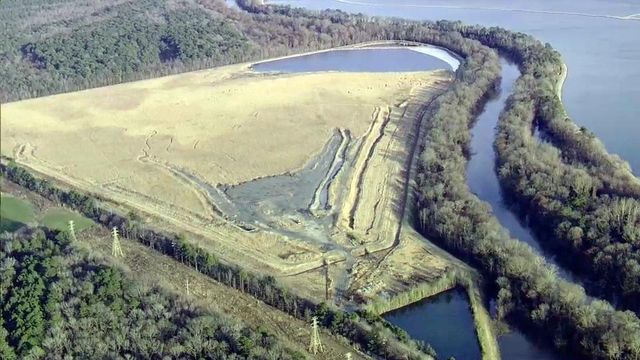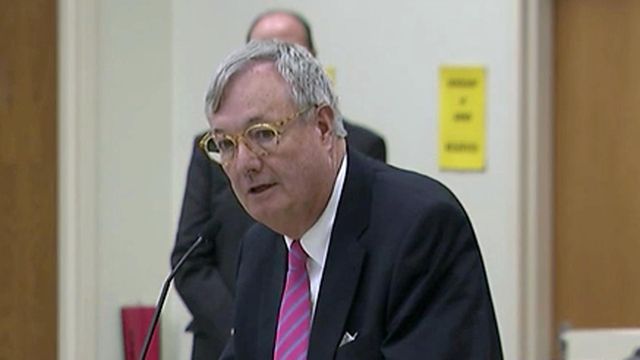Senate hears governor's coal ash plan
State senators had a lot of questions Thursday during their first committee hearing on Gov. Pat McCrory's proposed plan to clean up the state's 33 coal ash pits.
Posted — UpdatedThe plan, rolled out earlier this year, was presented to the Senate Agriculture and Environment Committee by Secretary of Environment and Natural Resources John Skvarla, who opened his remarks by taking issue with criticism of his agency's handling of the coal ash issue.
"The state of North Carolina is in charge of this process. No one else," Skvarla said defensively.
He pledged that "science and engineering will determine" what clean-up process the state will require of Duke Energy at each site, and he accused environmental groups of playing politics with DENR, noting that U.S. Environmental Protection Agency regulators had backed the state.
"According to them, DENR has done it right, and DENR will continue to do it right," Skvarla said. "But I can tell you right now, the governor's blueprint is not about politics. It’s about doing the right thing for North Carolina."
The plan calls for the coal ash to be removed at four "priority" sites: Riverbend in Gaston County, Asheville, Sutton in Wilmington and the Dan River plant near Eden where about 39,000 tons of ash spilled into the river four months ago. The proposal would require Duke to submit plans for the clean-up within 90 days of the enactment of the legislation.
Division of Water Resources director Tom Reeder called the closure plan the "crown jewel" of the governor's proposal but said Duke could be allowed to cap coal ash pits and leave the toxic sludge in place at some other sites.
"One size does not fit all," he said, reiterating that DENR "is driving the train here."
Reeder said new groundwater protections would also be underway in "a little over a year."
"I don't think you can ask for more than that," he added.
Senators asked skeptically whether the proposal includes any timetable or deadline for the actual cleanup to be completed. Skvarla replied that the timeline would depend on the plans submitted by Duke.
Sen. Ron Rabin, R-Harnett, disagreed with a provision giving the utility up to 24 hours to notify the state in case of a future spill.
"I can't see what the hang-up would be," Rabin said. "I can’t conceive of it taking that long."
Sens. Austin Allran, R-Catawba, and Tommy Tucker, R-Union, quizzed Skvarla on potential "beneficial" industry uses for coal ash, especially in concrete and construction.
Henry Batten, who owns Concrete Supply Co. in Charlotte, said North Carolina's concrete industry currently imports hundreds of thousands of tons of coal ash a year from other states because North Carolina's coal ash isn't fine enough or clean enough to use.
Batten urged lawmakers to take "common-sense" steps to change that as they weigh forcing Duke to remove its ash.
"Where are they going to move it?" he said. "I’m sitting here telling you that the industry wants to move it and consume it. Where you need to move it is into commerce and let the industry help you consume it."
George Everett, Duke's director of environmental and legislative affairs, explained that the 106 million tons of coal ash in North Carolina's pits has too much carbon and ammonia to be usable for industry, It could be processed with existing technology, he confirmed, but cautioned the processing plant would cost the utility $30 million to build.
Even if it did, Everett said, it would take industry users more than 100 years to consume the ash under current demand levels.
Environmental groups urged the Senate to adopt a tougher bill than the governor's proposal, which they called "a good starting point."
The Sierra Club's Cassie Garvin said a comprehensive coal ash plan needs to include set dates for the closure of the storage ponds, standards for how the clean-up will be conducted and rules for future handling of coal ash.
"We’re counting on you to prevent the problem from getting worse," Garvin told the committee.
Upper Neuse Riverkeeper Matthew Starr called on senators not to allow Duke to simply cap unlined ash pits, saying they're leaching toxins into drinking water every single day.
"For instance," Starr testified, "at the Lee facility in Goldsboro, groundwater is being poisoned by arsenic at over 60 times the state standard. Let that sink in. Sixty times the state standard."
The committee did not take a vote on the measure Thursday. Senators are expected to resume work on the measure next week.
Related Topics
• Credits
Copyright 2024 by Capitol Broadcasting Company. All rights reserved. This material may not be published, broadcast, rewritten or redistributed.






